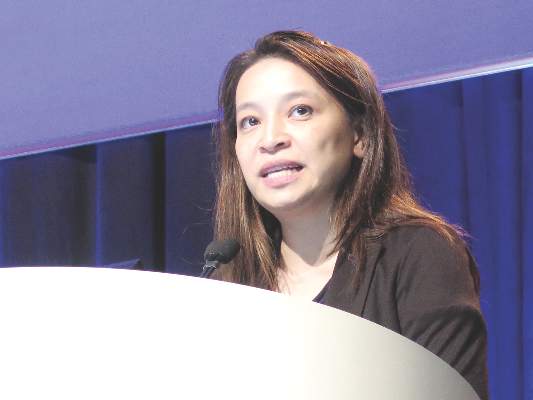User login
SAN FRANCISCO – Blockade of the cell surface receptor programmed death–1 (PD-1) is highly efficacious in patients with advanced noncolorectal cancers of the gastrointestinal tract that are deficient in mismatch repair, according to updated results of a phase II trial reported at the ASCO Gastrointestinal Cancers Symposium.
“Mutations have been shown to encode proteins that can be recognized and targeted by the immune system. The average tumor has dozens of somatic mutations; however, mismatch repair–deficient tumors harbor thousands of mutations,” noted first author Dr. Dung T. Le of the Sidney Kimmel Comprehensive Cancer Center, Johns Hopkins University, Baltimore. “This led to the hypothesis that immune augmentation with PD-1 blockade could be highly effective in mismatch repair–deficient tumors.”
Among 17 patients with noncolorectal cancers of the gastrointestinal tract treated with pembrolizumab in the trial and now having a median follow-up of 5.3 months, nearly half had a response according to radiographic criteria.
The findings expand on previously reported results for this cohort and also for a cohort in the trial having mismatch repair–deficient colorectal cancer, who benefited similarly (N Engl J Med. 2015;372:2509-20).
“Mismatch repair–deficient GI tumors are highly responsive to checkpoint blockade with anti–PD-1. Clinical benefit is noted across tumors with mismatch repair deficiency, including colon, stomach, duodenum, pancreas, ampullary, and bile duct cancers,” Dr. Le said at the symposium, which was sponsored by ASCO, ASTRO, the American Gastroenterological Association, and the Society of Surgical Oncology.
Invited discussant Dr. Bertram Wiedenmann of Charité University Hospital in Berlin said that pembrolizumab, with PD-1 blockade, “has impressive efficacy to be validated in a larger cohort of patients with various gastroenteropancreatic primaries.”
“What I think is the million dollar question is why you have patients who are MSI [mismatch repair deficient] and still not responding to the treatment,” he added. “There might be some other alterations in addition to MSI explaining the nonresponders.”
“We have to look at the inflammatory signature of these patients, and the question of whether we can use them as companion markers, aside from PD-L1, also PD-L2,” Dr. Wiedenmann maintained, referring to the ligands that bind to PD-1.
Patients were eligible for the trial if they had progressive advanced tumors and had received at least one prior therapy. Their tumors were tested for mismatch repair status by way of a commercially available immunohistochemistry kit for mismatch repair deficiency, or a PCR-based assay for microsatellite instability. They were treated with pembrolizumab (Keytruda), an antibody that targets PD-1, every 2 weeks.
In the cohort with mismatch repair–deficient noncolorectal cancers, the updated overall response rate was 47%, and the disease control rate was 76%, Dr. Le reported. Responses and durable responses were seen across tumor types.
The duration of response has ranged from 4 to 20 months, with most patients whose tumors initially responded still doing so as of the data cutoff for analysis.
The rate of grade 3 or 4 treatment-related adverse events was 12%, accounted for entirely by cases of diarrhea and colitis. “However, these were short lived and didn’t require steroids,” Dr. Le noted.
None of the patients experienced grade 3 or 4 rash/pruritus or immune-related endocrine disorders.
“Biochemical response correlates with radiographic response,” she reported, as there was generally good (though not perfect) concordance between the radiographic response and the response according to reductions in levels of cancer antigen 19-9 (CA 19-9).
The median duration of progression-free survival was not estimable. The median duration of overall survival was 21 months, and the 18-month survival rate was approximately 86%.
Dr. Le disclosed that she receives research funding from Aduro Biotech, Bristol-Myers Squibb, and Merck. Merck Sharp & Dohme Corp. was a collaborator on the trial. Dr. Wiedenmann disclosed that he had no conflicts of interest.
SAN FRANCISCO – Blockade of the cell surface receptor programmed death–1 (PD-1) is highly efficacious in patients with advanced noncolorectal cancers of the gastrointestinal tract that are deficient in mismatch repair, according to updated results of a phase II trial reported at the ASCO Gastrointestinal Cancers Symposium.
“Mutations have been shown to encode proteins that can be recognized and targeted by the immune system. The average tumor has dozens of somatic mutations; however, mismatch repair–deficient tumors harbor thousands of mutations,” noted first author Dr. Dung T. Le of the Sidney Kimmel Comprehensive Cancer Center, Johns Hopkins University, Baltimore. “This led to the hypothesis that immune augmentation with PD-1 blockade could be highly effective in mismatch repair–deficient tumors.”
Among 17 patients with noncolorectal cancers of the gastrointestinal tract treated with pembrolizumab in the trial and now having a median follow-up of 5.3 months, nearly half had a response according to radiographic criteria.
The findings expand on previously reported results for this cohort and also for a cohort in the trial having mismatch repair–deficient colorectal cancer, who benefited similarly (N Engl J Med. 2015;372:2509-20).
“Mismatch repair–deficient GI tumors are highly responsive to checkpoint blockade with anti–PD-1. Clinical benefit is noted across tumors with mismatch repair deficiency, including colon, stomach, duodenum, pancreas, ampullary, and bile duct cancers,” Dr. Le said at the symposium, which was sponsored by ASCO, ASTRO, the American Gastroenterological Association, and the Society of Surgical Oncology.
Invited discussant Dr. Bertram Wiedenmann of Charité University Hospital in Berlin said that pembrolizumab, with PD-1 blockade, “has impressive efficacy to be validated in a larger cohort of patients with various gastroenteropancreatic primaries.”
“What I think is the million dollar question is why you have patients who are MSI [mismatch repair deficient] and still not responding to the treatment,” he added. “There might be some other alterations in addition to MSI explaining the nonresponders.”
“We have to look at the inflammatory signature of these patients, and the question of whether we can use them as companion markers, aside from PD-L1, also PD-L2,” Dr. Wiedenmann maintained, referring to the ligands that bind to PD-1.
Patients were eligible for the trial if they had progressive advanced tumors and had received at least one prior therapy. Their tumors were tested for mismatch repair status by way of a commercially available immunohistochemistry kit for mismatch repair deficiency, or a PCR-based assay for microsatellite instability. They were treated with pembrolizumab (Keytruda), an antibody that targets PD-1, every 2 weeks.
In the cohort with mismatch repair–deficient noncolorectal cancers, the updated overall response rate was 47%, and the disease control rate was 76%, Dr. Le reported. Responses and durable responses were seen across tumor types.
The duration of response has ranged from 4 to 20 months, with most patients whose tumors initially responded still doing so as of the data cutoff for analysis.
The rate of grade 3 or 4 treatment-related adverse events was 12%, accounted for entirely by cases of diarrhea and colitis. “However, these were short lived and didn’t require steroids,” Dr. Le noted.
None of the patients experienced grade 3 or 4 rash/pruritus or immune-related endocrine disorders.
“Biochemical response correlates with radiographic response,” she reported, as there was generally good (though not perfect) concordance between the radiographic response and the response according to reductions in levels of cancer antigen 19-9 (CA 19-9).
The median duration of progression-free survival was not estimable. The median duration of overall survival was 21 months, and the 18-month survival rate was approximately 86%.
Dr. Le disclosed that she receives research funding from Aduro Biotech, Bristol-Myers Squibb, and Merck. Merck Sharp & Dohme Corp. was a collaborator on the trial. Dr. Wiedenmann disclosed that he had no conflicts of interest.
SAN FRANCISCO – Blockade of the cell surface receptor programmed death–1 (PD-1) is highly efficacious in patients with advanced noncolorectal cancers of the gastrointestinal tract that are deficient in mismatch repair, according to updated results of a phase II trial reported at the ASCO Gastrointestinal Cancers Symposium.
“Mutations have been shown to encode proteins that can be recognized and targeted by the immune system. The average tumor has dozens of somatic mutations; however, mismatch repair–deficient tumors harbor thousands of mutations,” noted first author Dr. Dung T. Le of the Sidney Kimmel Comprehensive Cancer Center, Johns Hopkins University, Baltimore. “This led to the hypothesis that immune augmentation with PD-1 blockade could be highly effective in mismatch repair–deficient tumors.”
Among 17 patients with noncolorectal cancers of the gastrointestinal tract treated with pembrolizumab in the trial and now having a median follow-up of 5.3 months, nearly half had a response according to radiographic criteria.
The findings expand on previously reported results for this cohort and also for a cohort in the trial having mismatch repair–deficient colorectal cancer, who benefited similarly (N Engl J Med. 2015;372:2509-20).
“Mismatch repair–deficient GI tumors are highly responsive to checkpoint blockade with anti–PD-1. Clinical benefit is noted across tumors with mismatch repair deficiency, including colon, stomach, duodenum, pancreas, ampullary, and bile duct cancers,” Dr. Le said at the symposium, which was sponsored by ASCO, ASTRO, the American Gastroenterological Association, and the Society of Surgical Oncology.
Invited discussant Dr. Bertram Wiedenmann of Charité University Hospital in Berlin said that pembrolizumab, with PD-1 blockade, “has impressive efficacy to be validated in a larger cohort of patients with various gastroenteropancreatic primaries.”
“What I think is the million dollar question is why you have patients who are MSI [mismatch repair deficient] and still not responding to the treatment,” he added. “There might be some other alterations in addition to MSI explaining the nonresponders.”
“We have to look at the inflammatory signature of these patients, and the question of whether we can use them as companion markers, aside from PD-L1, also PD-L2,” Dr. Wiedenmann maintained, referring to the ligands that bind to PD-1.
Patients were eligible for the trial if they had progressive advanced tumors and had received at least one prior therapy. Their tumors were tested for mismatch repair status by way of a commercially available immunohistochemistry kit for mismatch repair deficiency, or a PCR-based assay for microsatellite instability. They were treated with pembrolizumab (Keytruda), an antibody that targets PD-1, every 2 weeks.
In the cohort with mismatch repair–deficient noncolorectal cancers, the updated overall response rate was 47%, and the disease control rate was 76%, Dr. Le reported. Responses and durable responses were seen across tumor types.
The duration of response has ranged from 4 to 20 months, with most patients whose tumors initially responded still doing so as of the data cutoff for analysis.
The rate of grade 3 or 4 treatment-related adverse events was 12%, accounted for entirely by cases of diarrhea and colitis. “However, these were short lived and didn’t require steroids,” Dr. Le noted.
None of the patients experienced grade 3 or 4 rash/pruritus or immune-related endocrine disorders.
“Biochemical response correlates with radiographic response,” she reported, as there was generally good (though not perfect) concordance between the radiographic response and the response according to reductions in levels of cancer antigen 19-9 (CA 19-9).
The median duration of progression-free survival was not estimable. The median duration of overall survival was 21 months, and the 18-month survival rate was approximately 86%.
Dr. Le disclosed that she receives research funding from Aduro Biotech, Bristol-Myers Squibb, and Merck. Merck Sharp & Dohme Corp. was a collaborator on the trial. Dr. Wiedenmann disclosed that he had no conflicts of interest.
AT THE GASTROINTESTINAL CANCERS SYMPOSIUM
Key clinical point: Pembrolizumab is highly active and well tolerated in patients with mismatch repair–deficient tumors of the pancreas, ampulla, biliary tract, small bowel, and stomach.
Major finding: The objective response rate to pembrolizumab was 47%, and the rate of grade 3 or 4 treatment-related adverse events was 12%.
Data source: An analysis of 17 patients treated in a phase II trial for noncolorectal cancers of the gastrointestinal tract that were deficient in mismatch repair.
Disclosures: Dr. Le disclosed that she receives research funding from Aduro Biotech, Bristol-Myers Squibb, and Merck. Merck Sharp & Dohme Corp. was a collaborator on the trial. Dr. Wiedenmann disclosed that he had no conflicts of interest.


